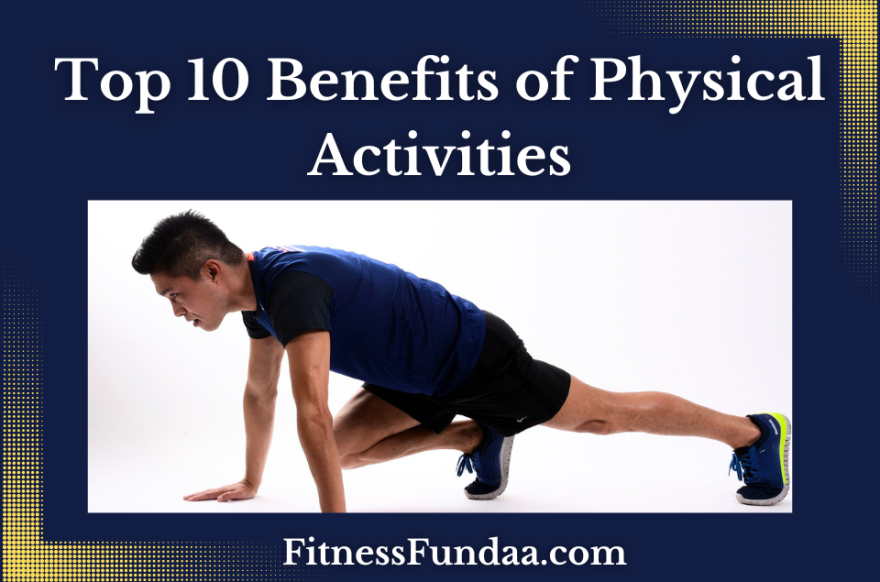The importance of physical activities cannot be overstated, as they play a pivotal role in enhancing overall health and well-being. Incorporating regular exercise into one’s lifestyle brings about a myriad of benefits that extend beyond just physical fitness. In this article, let’s dive deep into the benefits of physical activities and motivate ourselves to include them in our daily lives. Top 10 Benefits of Physical Activities. Benefits of Physical Activities.
Here are the Top 10 Benefits of Physical Activities
Enhanced Cardiovascular Well-being:
Engaging in regular physical activities becomes a vital cornerstone in maintaining a robust cardiovascular system. As you immerse yourself in exercise, your heart operates with heightened efficiency, orchestrating a symphony of improved blood vessel dilation to enhance the overall flow of blood.
This orchestrated performance not only lowers blood pressure but also acts as a formidable shield against potential adversaries such as heart disease, stroke, and other cardiovascular maladies. Additionally, exercise becomes the diligent courier, facilitating the circulation of life-sustaining oxygen and nutrients throughout the body, fortifying the very foundation of cardiovascular health.
Weight Mastery:
The role of physical activities in managing weight is pivotal, akin to a skilled conductor leading an orchestra. Every exercise session serves as a conductor’s baton, orchestrating the expenditure of energy that begets a calorie deficit crucial for weight loss.
Moreover, this well-choreographed routine harmonizes with an accelerated metabolism, creating a virtuous cycle that aids in effortlessly maintaining a healthy weight. When synchronized with a balanced diet, this orchestrated effort becomes a powerful strategy in averting the specter of obesity and its associated ailments, such as type 2 diabetes and joint complications.
Revitalized Mental Harmony:
The transformative effects of exercise on mental well-being unfold like a mesmerizing sonnet. It acts as a maestro, coaxing the release of endorphins—nature’s euphoric harmonies—that resonate as natural mood elevators. Furthermore, this symphony extends its tendrils to the brain, orchestrating an increased circulation of blood and oxygen.
This cerebral crescendo not only supports cognitive function but also guards against the ominous shadows of cognitive decline. This symphony of wellness is intricately woven to lower stress, and anxiety levels, and alleviate the echoes of depression, offering a holistic sanctuary for mental health.
Muscular Vigor and Flexibility Flourish:
The ballet of physical activities, particularly those entwined with resistance training and stretching, choreographs the development of robust muscles and enhanced flexibility. These well-rehearsed moves provide a sturdy scaffold, a protective dance that lends support to joints and bones, warding off the specter of injuries.
The ballet’s grace extends to improved flexibility, a nimble pirouette that enhances the range of motion and postural elegance, fostering the very essence of musculoskeletal well-being. This choreography is especially poignant in averting conditions such as osteoporosis and in maintaining the fluidity of movement with time.
Serenading Sleep Quality:
The nocturnal ballet of exercise weaves its magic on the tapestry of sleep quality. Each exercise session becomes a lullaby, orchestrating the regulation of the sleep-wake cycle and summoning the release of melatonin, the sleep-inducing enchantress.
By diminishing stress and anxiety, exercise creates a nocturnal sonata that invites a state of tranquil repose, paving the way for restful sleep. A consistent regimen of this nocturnal ballet unfolds as a potent remedy, alleviating the nuances of insomnia and ushering in the sweet embrace of revitalizing sleep.
Immunity’s Symphonic Resilience:
The measured dance of moderate exercise emerges as a potent symphony that fortifies the immune system. It orchestrates the crescendo of immune cell production and activity, akin to a vigilant guardian safeguarding the body’s sanctity.
This orchestrated performance mitigates inflammation and propels a harmonious circulation, erecting a resilient bulwark against infections and chronic maladies. While intense exercises may momentarily temper the immune system, the measured rhythm of moderate exercise bestows a protective cloak, staving off the specter of ailments and ensuring the sustained resilience of the body’s immune symphony.
Cognitive Flourish:
The cognitive odyssey propelled by physical activity unfurls as an epic saga of growth and sustenance for brain cells. The exercise symphony orchestrates an opulent flow of blood to the brain, ensuring the delivery of vital oxygen and nutrients essential for the zenith of cognitive performance.
This cerebral ballet is not merely a spectacle; it is a profound link to the realms of enhanced memory, sharpened attention, and adept problem-solving skills. Additionally, this symphony emerges as a valiant protector, reducing the vulnerability to neurodegenerative conditions such as Alzheimer’s disease.
Social Tapestry of Wellness:
Engaging in physical activities is akin to entering a vibrant social ballroom, where individuals intertwine in shared movements. Whether it be the communal dance of group fitness classes, the synchronized coordination of team sports, or the harmonious rhythm of outdoor activities, the social aspect of exercise crafts a tapestry of community.
This social engagement is not mere choreography; it is the building of relationships that echo through the corridors of improved mental health, emotional well-being, and a robust support system fostering the maintenance of a harmonious lifestyle.
Prolonged Life’s Melody:
The harmonious notes of studies resonate in unison, unveiling a compelling connection between regular physical activity and the elongation of life’s melody. The engagement in exercise becomes the guardian of longevity, warding off chronic diseases like a vigilant sentinel.
Heart disease, diabetes, and certain cancers, the ominous shadows of premature mortality, retreat in the face of this sustained symphony of health. The cumulative effect of this orchestrated lifestyle, entwined with regular physical activity, balanced nutrition, and the avoidance of detrimental habits, fashions a resounding melody that prolongs life and bestows the gift of a vibrant and wholesome existence.
Harmony of Life’s Grand Opera:
Engaging in physical activities is the maestro’s baton orchestrating the grand opera of well-being. This symphony extends its tendrils to encompass physical, mental, and emotional health. The regular exercise regimen becomes the conductor, harmonizing a positive mood, reducing stress, and elevating the individual’s capacity to navigate life’s challenges.
This holistic symphony of well-being is not merely a performance; it is the interwoven threads of improved physical health, enhanced mental well-being, and the harmonious chords of social connections. This grand opera becomes the cornerstone, the essence of a life not just lived but celebrated, emphasizing the intrinsic interconnectedness of the various facets of well-being.
In conclusion, the importance of physical activities is undeniable, serving as the cornerstone for overall health and well-being. The symphony of benefits, from cardiovascular well-being to cognitive flourishing and social engagement, paints a compelling picture.
Let this brief exploration be a source of inspiration, encouraging us to weave regular physical activities into the fabric of our daily lives—a harmonious celebration of vitality and a key to a fulfilling existence.
FAQs Answered
Q: How do physical activities benefit cardiovascular health?
A: Physical activities enhance heart efficiency, improve blood circulation, and lower blood pressure, reducing the risk of cardiovascular diseases.
Q: Can exercise help with weight management?
A: Yes, exercise creates a calorie deficit, aids weight loss, and, when combined with a balanced diet, prevents obesity and related health issues.
Q: What impact does exercise have on mental well-being?
A: Exercise releases endorphins, and reduces stress, anxiety, and symptoms of depression, promoting holistic mental health.
Q: How do physical activities contribute to muscle strength and flexibility?
A: Resistance training and stretching in physical activities develop strong muscles, improve flexibility, and reduce injury risks.
Q: Can exercise improve sleep quality?
A: Yes, regular exercise regulates the sleep-wake cycle, releases sleep-inducing hormones, and improves sleep patterns.
Q: Does moderate exercise boost the immune system?
A: Moderate exercise enhances immune cell activity, reduces inflammation, and provides protection against infections and chronic diseases.
Q: What impact does exercise have on cognitive function?
A: Exercise promotes the growth of brain cells, enhances blood flow to the brain, and is linked to improved memory and reduced risk of neurodegenerative conditions.
Q: How does physical activity contribute to social well-being?
A: Physical activities involve social interactions, and building relationships that contribute to improved mental health, emotional well-being, and a support system.
Q: Is there a link between exercise and a longer lifespan?
A: Yes, regular physical activity is associated with a longer lifespan by preventing chronic diseases and promoting overall health.
Q: What is the overall impact of physical activities on well-being?
A: Engaging in physical activities contributes to holistic well-being, improving physical, mental, and emotional health, and creating a celebration of life’s interconnected facets.
See also :Top 10 exercises to increase height

